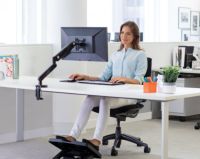New research released today has revealed that 80% of UK office workers have spent money on their own makeshift solutions to make their workstations more comfortable, with one in five admitting spending over £75 on their own equipment.
UK office workers admitted they were using cushions to make their office chairs more comfortable, objects to help lift up their laptops to the right height and boxes or storage under desks to support their feet. Furthermore, 60% even admitted to buying ergonomic equipment themselves including back supports, wrist supports and laptop risers.
It's no surprise that workers are investing their own money into solutions with nearly 75% of the 1000 UK office workers questioned by workspace solutions specialists Fellowes, suffering physical pain from their workspace set-up. The most common symptoms include:
- Backache (32%)
- Headache (23%)
- Neck Pain (20%)
- Eyesight Problems (18%)
- Wrist Discomfort (17%)
And it's not just the physical symptoms that are affecting employees, 74% of people are worried about the amount of time they are spending sitting at their desk for long periods, with 25% even saying it is a constant worry.
Although employees are concerned about the effects of the workplace on their health, half haven't made a complaint to anyone about their uncomfortable office equipment. For those that have complained, 20% have spoken to their line manager, however, 18% just discussed problems with their colleagues. Perhaps most worryingly 67% of people think their employer doesn't care about their long-term health and wellbeing in the office.
One solution for wellbeing in the workspace is for employers to implement a Display Screen Equipment assessment which can help workers combat discomfort in the neck, shoulders, back, arms and wrists as well as fatigue and eye strain. However, when asked over 50% of people said they have never had or couldn't remember having a DSE assessment and over a third of office workers said they had never heard of the regulation even though it's a legal requirement for employers to carry out.
Stephen Bowden, Ergonomic Expert from Morgan Maxwell said; "The findings are concerning and show a clear need for businesses to improve their policies to ensure employees are comfortable in the workplace. People are rightly concerned about the long-term health issues that can arise from sitting for long-periods and are clearly looking for help as they are willing to spend their own money on makeshift solutions. Employers should consider identifying the necessary ergonomic equipment such as back supports, wrist supports and monitor arms which are available for employees to prevent aches, pains and mental distress."
Fellowes unique 4 Zone approach is the ideal guide for ensuring good posture when working at a desk. It breaks down the office workstation into different sections to help office workers and employers understand what can be done to prevent specific aches and pains - and work healthily.To help with employees suffering in the workplace, Fellowes have put together top tips for Ergonomic solutions using its 4 Zone approach:
Backache - Sitting in a chair all day without the proper support can cause poor circulation and back discomfort. By investing in a back support, which is designed to help eliminate aches and improve back posture by ensuring the spine is correctly aligned when in a seated position you can minimise discomfort. Choose between different support types, attachments and materials depending on your working environment.
Headache/Eye Strain - When you're using a computer for long periods you may be more likely to get headaches. Computer monitors can also put the eyes under stress and if incorrectly positioned can cause slouching which can produce tension and increase the risk of a headache. By using either a monitor arm, monitor supports or laptop supports to position your screen in-line with your eyes and at an arm's length away, this can prevent the eyes having to strain and improves posture to prevent slouching and reduce the chances of getting a headache.
Neck Pain - Leaning forward and tilting your head up or down to view your screen can put strain on your neck and back. Similar to preventing headaches, making sure your screen is in line with your eyes is very important to preventing neck pain. Having the right monitor or laptop support is crucial to improve posture and preventing having to tilt your head.
Wrist Discomfort - Typing at a keyboard for hours at a time can cause pain and discomfort to your wrists. Investing in a wrist support helps to ensure your wrists stay in a neutral posture between typing and using a mouse, by resting the palm of your hand on them. Make sure to check the material type to avoid hard contact with the desk, and consider fabric for a softer rest.As part of its campaign to get workers ready for a healthier workplace, Fellowes aims to help workers thrive thanks to over 100 years of experience helping businesses work better. Fellowes believe that adopting good posture, sitting comfortably and being active at work not only makes employees feel better, but it helps them work better and stay healthier for longer. As workspace wellbeing experts, Fellowes help workers to be healthy, active, productive - and the very best they can be.
Find out more at ergo.fellowes.com






